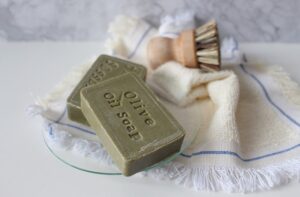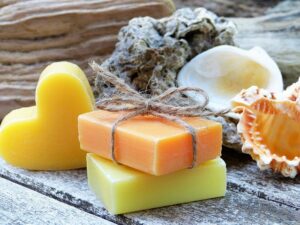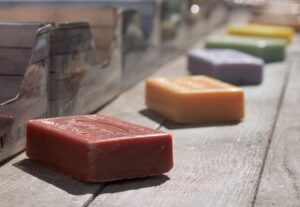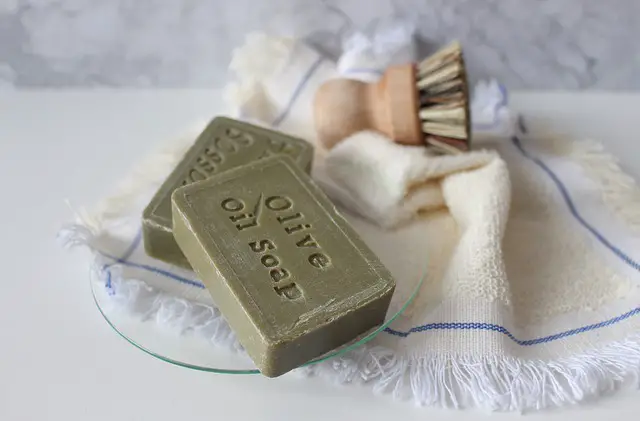
The history of soap is a long and interesting one. It all started with the need to cleanse oneself, and it has since become one of the most widely used household products in the world.
Soap has been around for thousands of years, and its invention is credited to a number of different people in different parts of the world.
The history of soap
The first recorded mention of soap was in ancient Babylon, where a Sumerian tablet from 2800 BC mentioned a soap-like substance used for washing.
Soap was also mentioned in the Bible, where it was referred to as “sudarium”, meaning “the sweat of the face”. In ancient Egypt, soap was made from animal fats and plant ashes.
The true origins of soap, however, are said to come from the Mediterranean area circa 2800 BC.
This is where the history of soap turns hazy since it’s difficult to describe who first discovered that mixing animal fats with wood ash would create a substance that could be used for washing.
The earliest mention of this practice was found in an ancient Roman document written in 300 BC.
Soap was also mentioned in Chinese texts from the 5th century AD, and it was used in India long before that.
In fact, the word “soap” is derived from the Sanskrit word “Sapo”, which means “to cleanse”. Soapmaking eventually spread to Greece, Italy and France, where it was used to make soap for bathing.
The invention of soap

Until the 18th century, soap production was a very time-consuming process. After animal fats were mixed with an alkaline substance derived from wood ashes or vegetable ashes, the concoction had to be boiled over an open fire for hours at a time.
This process was eventually replaced by the chemical process of saponification, which uses lye (an alkaline substance) to produce soap.
Soapmaking became an industrial process in the 18th century, and it soon became a popular item in Europe and America. Soap was used to cleanse both people and objects, and it soon became an essential part of everyday life.
Soap has come a long way since its humble beginnings, and it is now used in a variety of ways to cleanse both the body and the home.
It is a life-saving product that has been around for thousands of years, and its invention is something that we should all be grateful for.
Who invented saponification?
The saponification process was discovered by ancient civilizations around the world. It is difficult to know who exactly first invented the process since there are no written records of this momentous discovery.
However, it is known that Tukulti-Ninurta I of Assyria reportedly had a soap factory in 800 BC, and it’s likely that he was the first to develop the saponification process.
Soap making eventually spread to Greece, Rome and other parts of Europe, where it was refined and used for bathing and cleaning.
What did people use before soap?
People used a variety of different methods to cleanse themselves before the invention of soap. Some cultures used sand or ashes to scrub their skin, while others used water and cloths.
Soap was a much more effective way to cleanse oneself, and it soon became a popular item in households around the world.
Soap has come a long way since its humble beginnings, and it is now used in a variety of ways to cleanse both the body and the home.
It is a life-saving product that has been around for thousands of years, and its invention is something that we should all be grateful for.
When was hand soap invented?

Hand soap was not invented until the late 19th century. Up until that point, people used a variety of different methods to clean their hands, such as water and cloths, or sand and ashes.
Soap was a more effective way to cleanse hands, and it soon became a popular item in households around the world.
The first true bars of soap were not invented until 1869, and they were extremely popular. Hand-held bars of soap followed shortly after 1900, and the first liquid hand soap was patented in 1947.
Liquid hand soaps were a huge success, and within five years they made up over thirty percent of the market share for all bar soaps.
- Related post: The history of the light bulb and how it was invented
- Related post: The history of Glass – How Glass was invented
When was dishwashing liquid invented?
Dishwashing liquid was not invented until the early part of the 20th century. Prior to its invention, people relied on a variety of different methods to clean their dishes and cooking utensils.
Soap was a useful substance for many kinds of cleaning, but it did not work well in water that contained grease and oil.
Liquid dishwashing soap was invented by accident in 1933 when the new product Ultra-Brite failed to sell.
Instead of getting rid of this industrial mistake, Proctor & Gamble turned it into a huge success by combining it with an alkali solution and selling it as dishwashing liquid.
Today, many different companies produce millions of bottles of dishwashing liquid every year, and it is still a popular product to this day.
Soap has come a long way since its humble beginnings, and it is now used in a variety of ways to cleanse both the body and the home.
It is a life-saving product that has been around for thousands of years, and its invention is something that we should all be grateful for.
Conclusion
Soap has come a long way since its humble beginnings, and it is now used in a variety of ways to cleanse both the body and the home.
It is a life-saving product that has been around for thousands of years, and its invention is something that we should all be grateful for.



